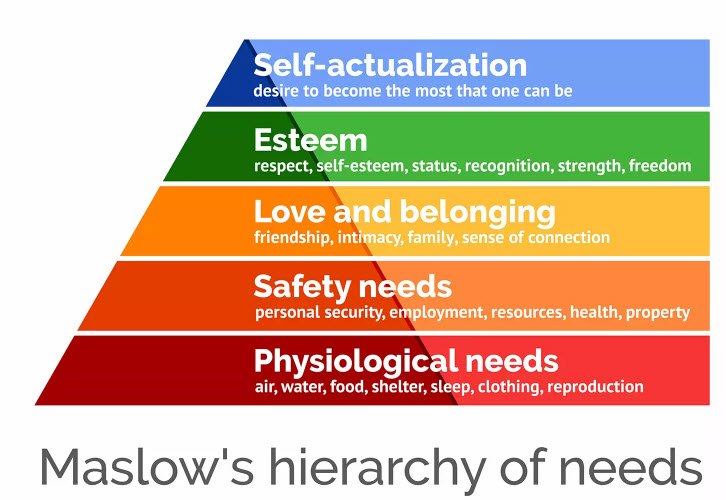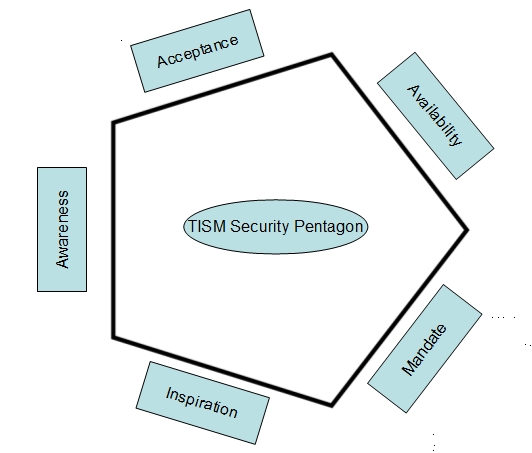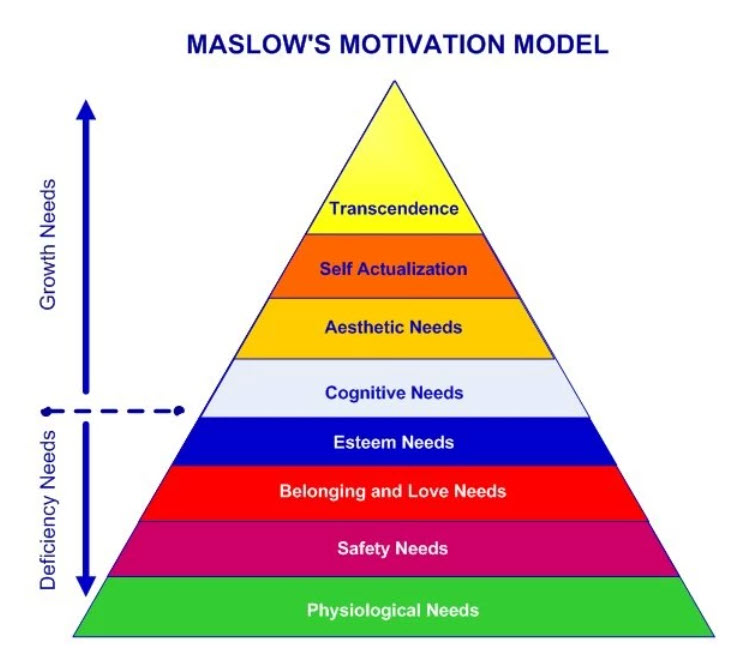 Abraham Harold Maslow is a great thinker of our generation who in 1942 gave a theory of motivation based on a hierarchy of needs.
Abraham Harold Maslow is a great thinker of our generation who in 1942 gave a theory of motivation based on a hierarchy of needs.
His work has been of great assistance to Corporate Managers to understand human behaviour and improve their managerial capabilities.
He continued to work in this field and updated this thoughts (Refer here) and expanded the original 5 step hierarchy to eight steps. He also agreed that the different aspects of motivation may follow flexible hierarchy in some individuals and often worked as a mix.
 Maslow’s theory suggested that humans are motivated by the fulfilment of their desires in five levels from physiological needs, to safety needs, to love and belonging needs, esteem needs and self-actualization needs.
Maslow’s theory suggested that humans are motivated by the fulfilment of their desires in five levels from physiological needs, to safety needs, to love and belonging needs, esteem needs and self-actualization needs.
Typically what this translates to is that employees are initially motivated by salary and remuneration but once satisfied, they cease to be motivators. Security of job, Love and belonging follow as next level of needs that motivate them. Then they look for designations and rewards to satisfy their “Esteem” until they reach a level of “Self-Actualization” where they get motivated by their own pursuit of excellence.
In our eternal search for motivation, Naavi propounded his own “Theory of Information Security Motivation” (TISM) where it was suggested that the elements of motivation are better organized in a close loop than a hierarchical pyramid.
 In this model, Naavi suggested that for motivating the employees for adopting a security culture, a “Pentagon Model” with five needs namely Awareness, Acceptance, Availability, Mandate and Inspiration could be considered as a better fit but not as a pyramid of hierarchical levels but as a closed loop.
In this model, Naavi suggested that for motivating the employees for adopting a security culture, a “Pentagon Model” with five needs namely Awareness, Acceptance, Availability, Mandate and Inspiration could be considered as a better fit but not as a pyramid of hierarchical levels but as a closed loop.
The principle of closed loop was that all the requirements formed a boundary and it should be closed so that their is no leakage.
Now Maslow has expanded the levels of motivation from 5 to eight by adding “Cognitive” “Aesthetic” and “Transcendence” levels  as indicated below. We shall not go into the detailed analysis of this theory, we can note an important grouping of “Deficiency Needs” and “Growth Needs”. The “Deficiency Needs” are those where after fulfilment, the motivation decreases. In “Growth Needs”, motivation increases as the needs are met.
as indicated below. We shall not go into the detailed analysis of this theory, we can note an important grouping of “Deficiency Needs” and “Growth Needs”. The “Deficiency Needs” are those where after fulfilment, the motivation decreases. In “Growth Needs”, motivation increases as the needs are met.
In a way this bridges the gap between Maslow’s theory and Herzberg’s theory of “Hygiene factors” and “Motivational factors” which also holds some value.
Service oriented organizations like FDPPI have been looking for a CEO of late and in this context taking a re-look at Maslow’s Theory to understand what kind of a person would suit to be a CEO of FDPPI appeared interesting. (These discussions may also help Start Up ventures to select a CEO)
Obviously, a Start-up like FDPPI cannot afford to pay a salary which an individual deserves to make by comparison. If the world consists of only persons who can be motivated by salary, and the person with the right credentials of experience and skill is still at this level, it would be difficult to find a motivated person for the position. Fortunately the world also consists of many others who work for “Self Actualization” and are motivated by other aspects of performance.
According to experts, the characteristics of self-actualized people consist of the following:
1. They perceive reality efficiently and can tolerate uncertainty;
2. Accept themselves and others for what they are;
3. Spontaneous in thought and action;
4. Problem-centered (not self-centered);
5. Unusual sense of humor;
6. Able to look at life objectively;
7. Highly creative;
8. Resistant to enculturation, but not purposely unconventional;
9. Concerned for the welfare of humanity;
10. Capable of deep appreciation of basic life-experience;
11. Establish deep satisfying interpersonal relationships with a few people;
12. Peak experiences;
13. Need for privacy;
14. Democratic attitudes;
15. Strong moral/ethical standards.
The behaviour that leads to self-actualization is identified as follows:
(a) Experiencing life like a child, with full absorption and concentration;
(b) Trying new things instead of sticking to safe paths;
(c) Listening to your own feelings in evaluating experiences instead of the voice of tradition, authority or the majority;
(d) Avoiding pretense (‘game playing’) and being honest;
(e) Being prepared to be unpopular if your views do not coincide with those of the majority;
(f) Taking responsibility and working hard;
(g) Trying to identify your defenses and having the courage to give them up.
We may add here that self-actualization is considered a matter of degree, ‘There are no perfect human beings’. It is not necessary to display all 15 characteristics to become self-actualized, and not only self-actualized people will display them.
Maslow did not equate self-actualization with perfection. Self-actualization merely involves achieving one’s potential. Thus, someone can be silly, wasteful, vain and impolite, and still self-actualize. Less than two percent of the population achieve self-actualization.
FDPPI is looking for some body in this 2% who can take over the role of a “CEO of FDPPI” not necessarily as a philanthropic assignment but on a predominantly “Variable remuneration ” basis.
The first thought that may cross many minds is that this is a utopian thought and how can some body work full time without a fixed salary?. But a person with the confidence of building an organization generate revenue and share in the prosperity can consider the challenge at least as a one year contract.
Naavi looks forward to proposals from interested persons with experience, skill and attitude to lead the next phase of development of FDPPI.
Naavi






